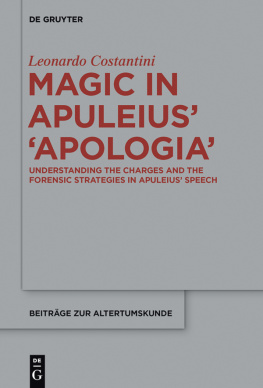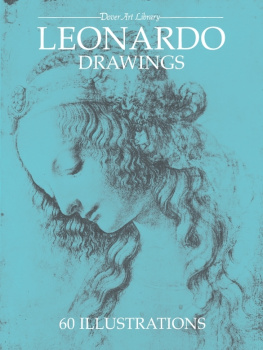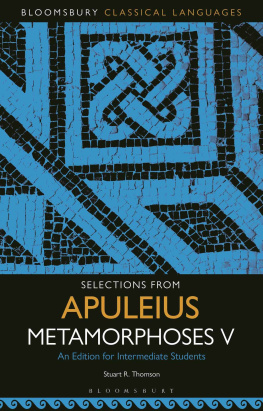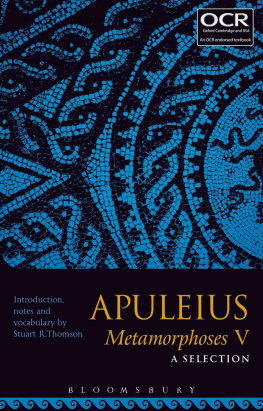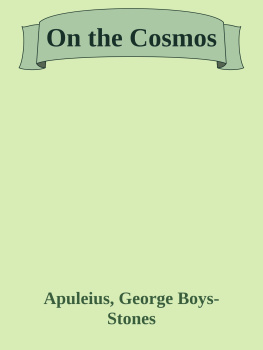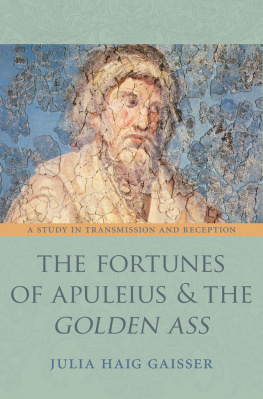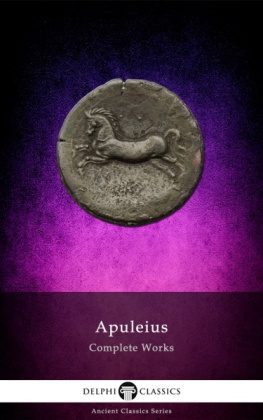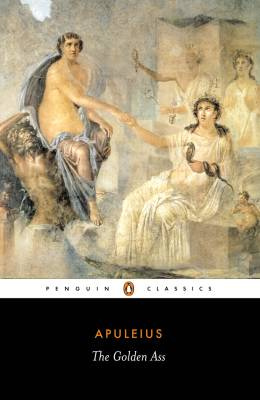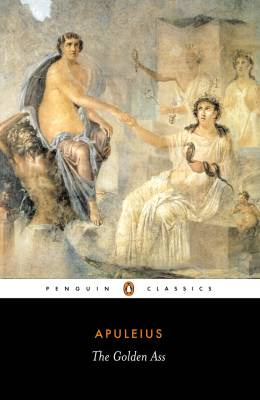Contents
Guide

Leonardo Costantini
Magic in Apuleius Apologia
Beitrge zur Altertumskunde

Herausgegeben von Susanne Daub, Michael Erler,
Dorothee Gall, Ludwig Koenen und Clemens Zintzen
Band 373
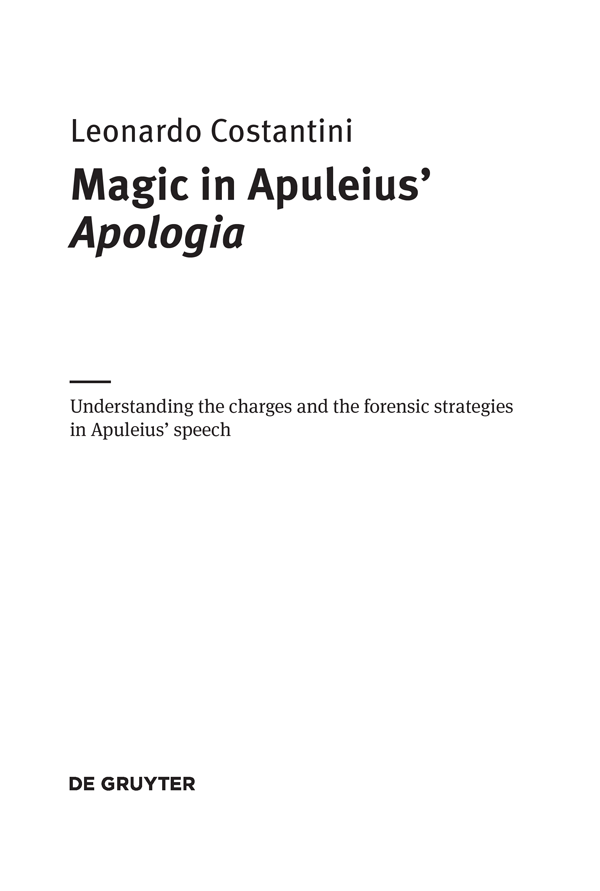
ISBN 978-3-11-061659-0
e-ISBN (PDF) 978-3-11-061752-8
e-ISBN (EPUB) 978-3-11-061667-5
ISSN 1616-0452
Library of Congress Control Number: 2018964951
Bibliographic information published by the Deutsche Nationalbibliothek
The Deutsche Nationalbibliothek lists this publication in the Deutsche Nationalbibliografie; detailed bibliographic data are available on the Internet at http://dnb.dnb.de.
2019 Walter de Gruyter GmbH, Berlin/Boston
www.degruyter.com
Acknowledgements
This book springs from a doctoral dissertation written at the University of Leeds between October 2013 and November 2016. This project came into being because of a genuine curiosity about magic in the Greco-Roman world, a topic of which I knew little before my arrival at Leeds. This reckless curiosity has led me to delve into Apuleius extraordinary Apologia , which this book attempts to explore.
I owe many debts of gratitude to various people, without whose contributions and assistance this work would not have been possible. First, I would like to thank my doctoral supervisors Regine May and Malcolm Heath. They have been a precious source of advice, and have patiently read and commented on the drafts of the dissertation and then the book itself. I am also indebted to Jan Bremmer, Ben Cartlidge, Robert Carver, Sara Chiarini, Christopher Faraone, Julia Gaisser, Luca Graverini, Owen Hodkinson, Dniel Kiss, Almuth Lotz, Juan Martos, Tom McCreight, Svenja Nagel, Lara Nicolini, Michael Paschalis, Luigi Pellecchi, Francesca Piccioni, Emmanuel Plantade, Patricia Rosenmeyer, and Stefan Tilg for their encouragement and for their kind help on matters concerning Apuleius, the Second Sophistic, literary and textual criticism, and ancient magic. I wish to express my gratitude to my PhD examiners Emma Stafford and Stephen Harrison. He and Antonio Stramaglia have greatly helped me in the process of turning the doctoral dissertation into the present book, for which I am deeply grateful. Finally, I want to thank my family and Hollie, to whom this book is dedicated.
Freiburg im Breisgau, September 2018
List of Abbreviations
| AE | (1888) L Anne pigraphique (Paris). |
| ANRW | Haase, W. and Temporini, H. (eds.) (1972) Aufstieg und Niedergang der rmischen Welt , part I, 4 vols., part II, 37.3 vols. (Berlin and New York). |
| Brill s New Pauly | Cancik, H. and Schneider, H. (eds.) (20022010) Brill s New Pauly. Encyclopaedia of the Ancient World , 15 vols. (Leiden). |
| CGL | Loewe, G. and Goetz, G. (18731901) Corpus Glossariorum Latinorum (Leipzig and Berlin). |
| CIL | Mommsen, T., Dessau, H., and Hirschfeld, O. (1862) Corpus inscriptionum Latinarum (Berlin). |
| CML | (1915) Corpus Medicorum Latinorum , 8 vols. (Berlin). |
| CRF | Ribbeck, O. 1898. Comicorum Romanorum Fragmenta , 3 rd edn. (Leipzig). |
| DAGR | Daremberg, C. and Saglio, E. (eds.) (18771919) Dictionnaire des antiquits grecques et romaines , 5 vols. (Paris). |
| DK | Diels, H. and Krantz, W. (1989) Die Fragmente der Vorsokratiker , 17 th edn., 3 vols. (Zurich and Hildesheim). |
| Enc. Art. Ant . | (19581984) Enciclopedia dell arte antica, classica e orientale , 10 vols. (Rome). |
| Enc. Berb . | (1984) Encyclopdie berbre (Leuven). |
| Enc. Virgil . | (19841991) Enciclopedia Virgiliana , 5 vols. (Rome). |
| FGrH | Jacoby, F. (ed.) (1923) Die Fragmente der griechischen Historiker (Berlin). |
| GCN | Hofmann, H. and Zimmerman, M. (eds.) (19881998) Groningen Colloquia on the Novel , 9 vols. (Groningen). |
| IG | (1873) Inscriptiones graecae (Berlin). |
| ILA | Gsell, S. (19221976) Inscriptions latines de l Algrie (Paris). |
| LIMC | (19811999) Lexicon Iconographicum Mythologiae Classicae , 9 vols. and Supplementum (2009) (Zrich). |
| LSJ | Liddel, H. G., Scott, R., and Jones, H. S. (2009) A Greek English Dictionary. With a revised supplement (Oxford). |
| OLD | Glare, P. G. W. (2012) Oxford Latin Dictionary , 2 vols., 2 nd edn. (Oxford). |
| PCG | Kassel, R. and Austin, C. (19832001) Poetae comici Graeci (Berlin). |
| RAC | (1950) Reallexikon fr Antike und Christentum , 26 vols. (Stuttgart). |
| RE | (19031972) Paulys Real - Encyclopdie der classischen Alterthumswissenschaft , 19 vols. (Stuttgart). |
| Rh | Waltz, C. (18321836) Rhetores Graeci , 9 vols. (Stuttgart and London). |
| TheDeMa | Dreher, M. (ed.) (2015) Thesaurus Defixionum Magdeburgensis (online resource). |
| ThesCRA | (20042005) Thesaurus Cultus et Rituum Antiquorum , 5 vols. (Los Angeles). |
| ThLL | (1900) Thesaurus Linguae Latinae (Leipzig). |
| TRF | Ribbeck, O. (1897) Tragicorum Romanorum Fragmenta , 3 rd edn. (Leipzig). |
| TrGF | Snell, B., Kannicht, R., and Radt, S. (19712004) Tragicorum Graecorum fragmenta , 5 vols. (Gttingen). |
Reference Abbreviations
The reference abbreviations for ancient sources are those found in the OLD and the LSJ . When an author is not acknowledged in the lists of abbreviations of these lexica, I have used those in The Oxford Classical Dictionary (20124) and in the ThLL . Unless otherwise specified, the editions of Greek and Latin texts to which I refer are those available in the Thesaurus Linguae Graecae ( TLG online ) and in the Library of Latin Texts Online ( LLT - O ). The reference abbreviations for journals and periodicals employed are those of L Anne philologique . I frequently refer to Audollents edition of the Defixionum Tabellae (1904) throughout this book, indicating Audollents numeration of each curse-tablet and the specific line/lines to which I refer (e. g. Audollent 1904: 135 a .56 = inscription no. 135, side a, lines 5 and 6). When I refer, instead, to Audollents introduction, I indicate the pages in Roman numerals; when referring to his commentary, I add p. or pp. before the number of the page/pages, given in Arabic numerals.
1Introduction
1.1The Purpose of this Book
This monograph offers a new interpretation of Apuleius Apologia , a defence-speech on magic delivered in the courtroom of the North African city of Sabratha in AD 158/159. It aims to address two main questions: first, the extent to which Apuleius arguments could betray his controversial knowledge of magic and, second, the importance and the dangerous implications of the allegations brought against him. By analysing the Apologia sequentially I shall reconstruct, on the one hand, the content of the prosecutions case, which Apuleius heavily distorts in order to avoid any threatening innuendos. On the other hand, I will explore Apuleius forensic techniques and assess the Platonic ideology underpinning his speech: I propose that a Platonising reasoning distinguishing between higher and lower concepts lies at the core of Apuleius rhetorical strategy, and that Apuleius aims to charm the judge, the audience, and ultimately his readers, with the irresistible power of his arguments.

